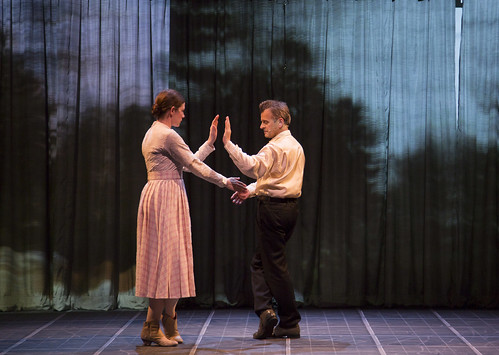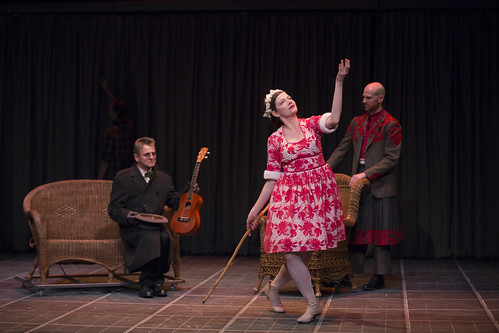Why won't Baryshnikov smile?
 Tymberly Canale and Mikhail Baryshnikov perform a subtle pas de deux between an unmarried man and a married woman in About Love, the second piece featured in Man in a Case at Berkeley Repertory Theatre. Below: Canale is Barbara, an outgoing Ukrainian beauty, who dances for Baryshnikov's Belikov, while and Aaron Mattocks as Kovalenko, Barbara’s brother, keeps a wary eye. Photos by T. Charles Erickson
Tymberly Canale and Mikhail Baryshnikov perform a subtle pas de deux between an unmarried man and a married woman in About Love, the second piece featured in Man in a Case at Berkeley Repertory Theatre. Below: Canale is Barbara, an outgoing Ukrainian beauty, who dances for Baryshnikov's Belikov, while and Aaron Mattocks as Kovalenko, Barbara’s brother, keeps a wary eye. Photos by T. Charles Erickson
Perhaps not surprisingly, Mikhail Baryshnikov has once again crossed paths with high art. The legendary dancer has aged into a successful career as an actor/performance artist. At 66, he could simply retire. Or teach. But he continues to push himself in new directions.
This time out he is working with Big Dance Theater's Annie-B Parson and Paul Lazar to adapt to Anton Chekhov short stories ("Man in a Case" and "About Love") from later in the celebrated writer's career. But these aren't simple, straightforward adaptations. No, these are video installations. These are dance-movement pieces. These are expertly designed, often strikingly beautiful stage picture. In short, Man in a Case is performance art that did not forget about telling a story.
Chekhov's conceit of turkey hunters telling each other stories comes to the stage almost as a radio play with Chris Giarmo and Lazar speaking into microphones at a table. Baryshnikov enters quite casually and becomes Belikov, the subject of the first story, a school official who has encased himself in the severity of routine. He is universally feared and completely closed off to the world until he meets Barbara (Tymberly Canale) a Ukrainian lady (described as a "sugarplum") kept under the watchful eye of her brother (Aaron Mattocks). Belikov and Barbara embark on an awkward courtship, much of which is (oddly and delightfully) set to Carly Simon's "Coming Around Again." But a man as rigid as Belikov will not fall into the uneven, vulnerable rhythms of love easily, and tragedy ensues.
The second story, about an unmarried man who falls for a married woman and lets years pass without doing anything about it, allows Baryshnikov to dance – a little. Throughout, there's definite choreographed movement (by Parson), but here we get some actual dancing, and then there's a stunning high-tech video moment with Baryshnikov and Canale on the floor with a camera watching them from above and projecting their images on the rear of the set, Busby Berkeley style.
Video (designed by Jeff Larson, who appears on stage alongside sound designer Tei Blow) plays an enormous role in this 75-minute show, but it somehow never dominates. There are screens all over the place, but they're not automated. Humans actually have to go pull them down and them put them back up. When Belikov goes to sleep, his bed curtains surround the bed and become yet another screen to capture his dreams. When there's a standoff on the steep staircase behind the main playing area, a camera at the top captures the event, and the projected image looks like something from a European movie from the 1950s.
The soundscape, from ticking clocks to the click-clack of a train on the rails, also includes some live music making (guitars, accordions) and one especially striking sequence involving choral singing at a funeral. With so much storytelling, singing and exposing of the theatrical machine, it's hard not to think about Kneehigh, which was so recently on this very stage.
The video and the music and the movement combine to help the actors tell the stories, which, even with all the high-tech, high-art trappings, are infused with Chekhovian melancholy. Maybe that's why Baryshnikov looks so dour through so much of the show. Sure it'd be great to see him smile, but when you think about it, men in cases of their own making and men suffering from years of unrequited love don't really have much to smile about. But watching Baryshnikov work, we certainly do.
FOR MORE INFORMATIONBig Dance Theater's Man in a Case continues through Feb. 16 at Berkeley Repertory Theatre's Roda Theatre, 2015 Addison St., Berkeley. Tickets are $45-$125 (subject to chang). Call 510-647-2949 or visit www.berkeleyrep.org.
